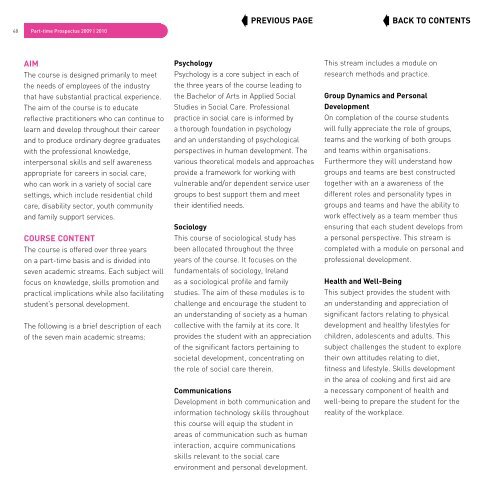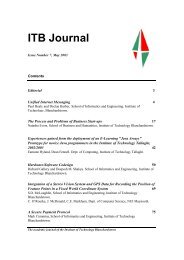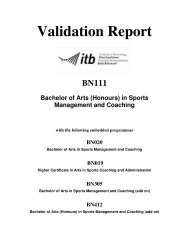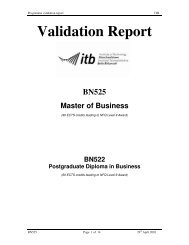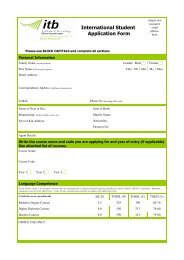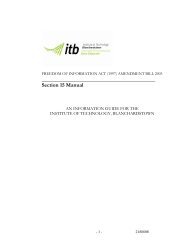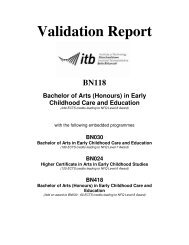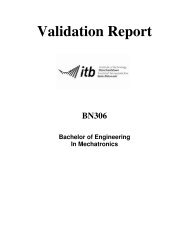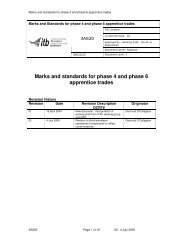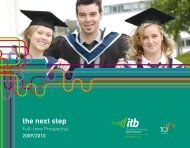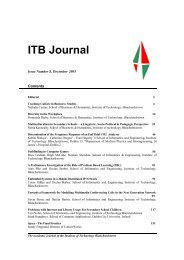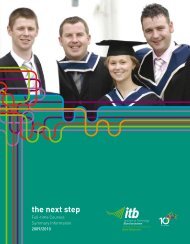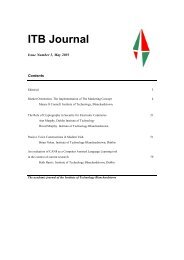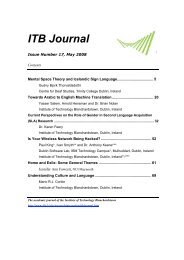new horizons - Institute of Technology Blanchardstown
new horizons - Institute of Technology Blanchardstown
new horizons - Institute of Technology Blanchardstown
You also want an ePaper? Increase the reach of your titles
YUMPU automatically turns print PDFs into web optimized ePapers that Google loves.
Previous Page BAck to Contents Next Page ➧<br />
BAck to Contents<br />
48<br />
Part-time Prospectus 2009 | 2010<br />
Social Studies Courses<br />
49<br />
AIM<br />
The course is designed primarily to meet<br />
the needs <strong>of</strong> employees <strong>of</strong> the industry<br />
that have substantial practical experience.<br />
The aim <strong>of</strong> the course is to educate<br />
reflective practitioners who can continue to<br />
learn and develop throughout their career<br />
and to produce ordinary degree graduates<br />
with the pr<strong>of</strong>essional knowledge,<br />
interpersonal skills and self awareness<br />
appropriate for careers in social care,<br />
who can work in a variety <strong>of</strong> social care<br />
settings, which include residential child<br />
care, disability sector, youth community<br />
and family support services.<br />
COURSE CONTENT<br />
The course is <strong>of</strong>fered over three years<br />
on a part-time basis and is divided into<br />
seven academic streams. Each subject will<br />
focus on knowledge, skills promotion and<br />
practical implications while also facilitating<br />
student’s personal development.<br />
The following is a brief description <strong>of</strong> each<br />
<strong>of</strong> the seven main academic streams:<br />
Psychology<br />
Psychology is a core subject in each <strong>of</strong><br />
the three years <strong>of</strong> the course leading to<br />
the Bachelor <strong>of</strong> Arts in Applied Social<br />
Studies in Social Care. Pr<strong>of</strong>essional<br />
practice in social care is informed by<br />
a thorough foundation in psychology<br />
and an understanding <strong>of</strong> psychological<br />
perspectives in human development. The<br />
various theoretical models and approaches<br />
provide a framework for working with<br />
vulnerable and/or dependent service user<br />
groups to best support them and meet<br />
their identified needs.<br />
Sociology<br />
This course <strong>of</strong> sociological study has<br />
been allocated throughout the three<br />
years <strong>of</strong> the course. It focuses on the<br />
fundamentals <strong>of</strong> sociology, Ireland<br />
as a sociological pr<strong>of</strong>ile and family<br />
studies. The aim <strong>of</strong> these modules is to<br />
challenge and encourage the student to<br />
an understanding <strong>of</strong> society as a human<br />
collective with the family at its core. It<br />
provides the student with an appreciation<br />
<strong>of</strong> the significant factors pertaining to<br />
societal development, concentrating on<br />
the role <strong>of</strong> social care therein.<br />
Communications<br />
Development in both communication and<br />
information technology skills throughout<br />
this course will equip the student in<br />
areas <strong>of</strong> communication such as human<br />
interaction, acquire communications<br />
skills relevant to the social care<br />
environment and personal development.<br />
This stream includes a module on<br />
research methods and practice.<br />
Group Dynamics and Personal<br />
Development<br />
On completion <strong>of</strong> the course students<br />
will fully appreciate the role <strong>of</strong> groups,<br />
teams and the working <strong>of</strong> both groups<br />
and teams within organisations.<br />
Furthermore they will understand how<br />
groups and teams are best constructed<br />
together with an a awareness <strong>of</strong> the<br />
different roles and personality types in<br />
groups and teams and have the ability to<br />
work effectively as a team member thus<br />
ensuring that each student develops from<br />
a personal perspective. This stream is<br />
completed with a module on personal and<br />
pr<strong>of</strong>essional development.<br />
Health and Well-Being<br />
This subject provides the student with<br />
an understanding and appreciation <strong>of</strong><br />
significant factors relating to physical<br />
development and healthy lifestyles for<br />
children, adolescents and adults. This<br />
subject challenges the student to explore<br />
their own attitudes relating to diet,<br />
fitness and lifestyle. Skills development<br />
in the area <strong>of</strong> cooking and first aid are<br />
a necessary component <strong>of</strong> health and<br />
well-being to prepare the student for the<br />
reality <strong>of</strong> the workplace.<br />
Applied Social Studies<br />
This subject introduces the student to<br />
social care as a discipline and examines<br />
issues relating to social studies. This is a<br />
pivotal subject that provides opportunities<br />
to link theory to practice and integrates<br />
the learning from other subjects, and lays<br />
the foundation for their development as<br />
pr<strong>of</strong>essional practitioners.<br />
Supporting Studies<br />
In the case <strong>of</strong> recreation and creative<br />
studies, the course invites the student to<br />
partake in a personal journal <strong>of</strong> creativity<br />
and personal development. The course<br />
then moves on to challenge the student<br />
into both direct and indirect application<br />
<strong>of</strong> the creative methodologies <strong>of</strong> art,<br />
movement and drama, to the modern wider<br />
pr<strong>of</strong>essional social care environment.<br />
In the case <strong>of</strong> legal studies, the students<br />
will be equipped with knowledge relating<br />
to the factors which govern legislation in<br />
this country and with an understanding<br />
<strong>of</strong> the main legislative frameworks within<br />
which social care operates. The practice<br />
implications <strong>of</strong> such legislation and<br />
standards will be explored to equip the<br />
students with the necessary awareness to<br />
function as a pr<strong>of</strong>essional practitioner.<br />
Work Placement Projects<br />
The aim <strong>of</strong> this part <strong>of</strong> the course is to<br />
allow students to make clear connections<br />
between practical experiences and<br />
knowledge that has resulted from<br />
experience on the basis <strong>of</strong> appropriate<br />
and assessed learning outcomes, not the<br />
experience itself. During work placement,<br />
students will produce a portfolio to<br />
demonstrate evidence <strong>of</strong> knowledge<br />
skills and competencies acquired in the<br />
current workplace. The term portfolio<br />
refers to a claim for learning based on a<br />
collection <strong>of</strong> suitable pieces <strong>of</strong> evidence <strong>of</strong><br />
that learning and will demonstrate work<br />
based learning experiences in the context<br />
<strong>of</strong> potentially creditable learning.<br />
The portfolio and evaluation report will<br />
be appraised for authenticity (that the<br />
student has undertaken what is claimed),<br />
directness (that the learning is specific,<br />
relevant and has been identified and<br />
categorised), breath (that the learning<br />
took place in a wider theoretical and<br />
vocational context which was understood<br />
by the applicant), currency (that the<br />
learning is sufficiently recent to be<br />
relevant), and balance (between theory<br />
and practical application).<br />
APPLICATION<br />
For further details and an application<br />
form please contact the marketing team<br />
on 01 885 1000 or e-mail: info@itb.ie.


